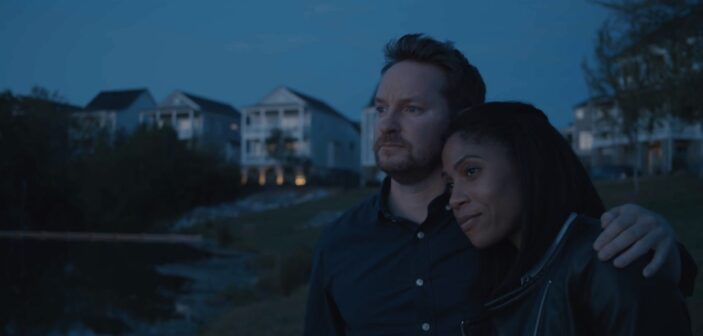
With the Black Lives Matter and #MeToo movements featured prominently, as well as the overall intertwined arc of the COVID-19 pandemic, Black White and the Greys is a film that eerily encapsulates the emotional push-and-pull we universally experienced.
A relatable, at-times uncomfortable drama, Black White and the Greys is a collaboration between Marchelle Thurman and Casey Nelson, who direct, write and lead the feature that starts off on a volatile note – we catch the middle of a heated argument between Thurman’s Jordie and Nelson’s Caleb, where phrases like “You’re so fucking mean” and “I don’t love you anymore” are thrown around with a pent-up aggression – and barely gives us a minute to catch our breath.
The brief reprieve we do receive sets the film in January of 2020, where Caleb and his best mate, Mike (Jay Jablonski, also serving as the film’s producer), talk about how 2020 will be “their year”; the irony is real. Whilst the opening argument paints us a certain picture of Jordie and Caleb, the film never brushes them as archetypal, with their frustration and anger at each other building from the evident love they share and a general sense of fear of the world they are rapidly seeing change before their eyes – or, at least, via the television as they remain steadfastly behind doors.
Caleb, who openly weeps at the news of Kobe Bryant’s death, which then prompts Jordie to question why a basketballer (and accused rapist) he didn’t know earns his tears, but the passing of her grandfather and family pet didn’t, takes something of a more casual approach to the pandemic at large, whilst Jordie maintains by the strict guidelines. Caleb, by no means, takes the situation lightly (Mike sure does though), but in him wanting to try and maintain a sense of normalcy, and Jordie forbidding any type of risky interaction, the film speaks to both mentalities that many of us adhered to. And, wisely, it refuses to pick a side.
The forced closeness that the pandemic thrust upon couples arguably picked at loose strands that may have been mended under a more delicate situation, and, like so many others, had Jordie and Caleb been able to breathe and manage space, it’s possible what comes to a head here may have only ever been a minor simmer. The Black Lives Matter movement proves one of the major points of contention for the couple, with Jordie, as a woman of colour, taking it personally, and Caleb, respectful of her feelings, coming under fire for recognising the “All Lives Matter” counter-movement that tried (and largely failed) to respect all people under the fire of abuse. Again, it’s view points that have validity on both ends, and regardless of how frustrating we think either their actions are, we can’t help but understand them.
Whilst the ugliness of humanity is something Thurman and Nelson comment on throughout Black White and the Greys, the film, thankfully, manages to be something of a cathartic experience due to the ultimate sweetness it embraces, highlighting that however painful things may become there’s a light awaiting at the end of the day; however cliché it may be to state so. Black White and the Greys feels like a snapshot into so many lives that were forced into an unnatural state, and though reliving such a time may be painful, it’s a compelling reminder to love those close to you and practice mutual understanding.
![]()
![]()
![]()
![]()
![]()
THREE AND A HALF STARS (OUT OF FIVE)
Black White and the Greys is available to rent or purchase through Prime Video in Australia. It’s currently available through Prime Video, YouTube, GooglePlay and Tubi in the United States, with other platforms to follow.
https://www.youtube.com/watch?v=jOXlMnelBxg
